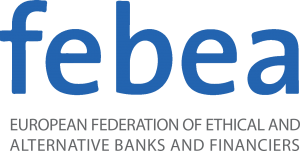- 20 YEARS OF FEBEA. ETHICAL FINANCE IN EVERYONE’S BEST INTEREST.
- FEBEA – 20 YEARS OF ETHICAL FINANCE STORIES IN EUROPE
- FEBEA TOLD BY ITS FOUR PRESIDENTS
- FEBEA’S HISTORY
- THE EVOLUTION OF ETHICAL FINANCE IN EUROPE
- ETHICAL FINANCE: MUCH MORE THAN SUSTAINABLE
- ETHICAL FINANCE EXPERIENCES: CITIZENS MONEY AT THE SERVICE OF SOCIETY
- 20 YEARS IS NOTHING, WHEN IT COMES TO ETHICAL FINANCE
- CRISE SANITAIRE: UN DEFI POUR LA FINANCE ETHIQUE
- HEALTH CRISIS: A CHALLENGE FOR ETHICAL FINANCE
– Read this article in Spanish on Valor Social and in Italian on Valori –
By Daniel Sorrosal, Secretary General at FEBEA
For those of us – like myself- who think in Spanish, the idea that twenty years of something have passed inevitably leads us to the song Volver by Carlos Gardel. This beautiful tango reminds us with melancholy that twenty years are nothing in the passing of time.
However, in the case of ethical finance the last twenty years have given much of themselves. This dossier demonstrates how a concept that, although it already existed in practice 20 years ago, has been taking shape, and has attracted new organizations in different countries. Ethical finance has been developed in a specific and recognizable way of doing finance that not only contributes to improving our society and the environment, but also produces good financial results. To the extent that today traditional banking, at least in its communication, tries to associate part of the principles of ethical finance with its image.
FEBEA: a place to exchange ideas and practices
In its institutional development, ethical finance has been endowed with a common instrument of exchange and representation, FEBEA, the Federation. And in retrospect, I think this has been one of the great successes of those visionaries who began to do finance with the common good in mind. And that they decided, almost from the beginning, to partner with their counterparts in other European countries. The Federation has allowed ethical funders to exchange ideas, experiment and develop common launch financing instruments. Furthermore, FEBEA has contributed to defining and explaining both the scope of action and the raison d’être of its members.
The dialogue with the European institutions and the access to european instruments
The common FEBEA project has also allowed ethical funders to maintain a constant dialogue with the European institutions. This dialogue began by seeking the recognition of the European institutions of the contribution of ethical finance to society, the economy and the environment. Over time, this dialogue has grown into a more complex relationship. Today FEBEA participates in multiple discussions at the European level, ranging from aspects of banking regulation, to the definition of social and environmental sustainability, to the implementation of policies to support employment and business creation and, more recently, to development. of the social economy.
On the other hand, the relationship with Europe has allowed FEBEA members to access European financial instruments – essentially guarantee programs – that enhance the development of their financing activities. This important participation in the use of European financial instruments has transformed the members of FEBEA into the main references at European level in the field of social finance.
In these 20 years FEBEA could explain what ethical finance is
These twenty years have allowed FEBEA to explain to the world what ethical finance is and what it is for. They have also shown that ethical finance can be very useful as an instrument for the implementation of public policies – of inclusion, employment, social innovation and sustainability. And they have transformed an almost utopian vision of finance and a miniscule activity within the financial world into the reference to be emulated by the banking sector – if not in deeds, at least in words – as a way to build a sustainable and inclusive future for generations to come.
In the unpredictable world in which we live, and in the midst of a pandemic of which we still do not see the end, it is difficult to project into the next twenty years. But if I dare to imagine here how the next decade can be. And right now, the outlook for ethical finance is more than positive at the European level.
The future of ethical finance
On the one hand, there is a growing interest, on the part of the European institutions, in the positive role that finance can have in the development of a much more sustainable economy and a more just and inclusive society. And that puts ethical funders at the forefront of what finance can bring to society. The European sustainable finance agenda, green taxonomy and social taxonomy are examples of Europe’s interest in other types of finance and instruments to encourage the financial world to get involved in the challenge of sustainability and social inclusion. In this context, the members of FEBEA not only have a lot to contribute, since they have been pioneers in these areas, but they also have almost unique experience and savoir faire. Our challenge in the next decade is going to be to value our finance model, which is in fact far ahead of what Europe is only beginning to imagine. And explain how it can be useful again in the development of European policies for sustainability, economic growth and social inclusion, such as the “Green Deal”, the “Next Generation Fund” or “Invest EU”.
The development of social economy
In addition to the sustainability agenda, the European Union will develop in the next decade a comprehensive plan for the development of the social economy. And this plan directly affects us ethical funders. Because we are the main funders of the social economy today and we have also specialized over time in responding effectively to the needs of this sector. For this reason, all the legislative, financing and promotion measures for the social economy that the European Union is going to implement in the coming years to develop the social economy represent a huge opportunity for ethical funders. First, because they promote an economic model that is also ours and that puts people ahead of benefits, that promotes the reinvestment of these in favor of the social and environmental mission and a participatory and democratic management model of organizations. And second, because the more the social economy grows, the more ethical finance can grow, financing this growth.
There’s a need for a finance that does not create or accelerate economic crisis
Finally, European society, which is currently experiencing its fourth economic crisis in 20 years, is increasingly receptive to the role that finance has in creating and accelerating these crises. With each new crisis, a significant number of citizens rethink their priorities, their way of consuming, their role as actors in society. And this leads them to question what happens to their money and what traditional financial institutions use it for. The many citizens who are concerned about the climate crisis, about the effects of the pandemic on the economy, about the short-term and extractive model of our companies, also do so about how banks and investors behave. This represents an enormous opportunity for ethical funders to attract more and more savers, investors and clients, who promote their growth as credit institutions and as agents of positive change. The challenge for FEBEA and our members must be to respond to a growing demand with new savings, investment and financing services.
The challenges for FEBEA
For all this, FEBEA has already begun to work together with its members in what we have called the Kairos Plan, a participatory process in which we have involved our members in the design of FEBEA’s future strategy. A strategy that prepares us to face all these challenges and that allows us to transform the tailwind that comes from Europe and our own societies into tools to grow ethical finance in Europe.
The word kairos, means in Greek, the right moment to do something. Ethical funders probably found ourselves more than ever at that kairos moment. It is our responsibility to take action and accelerate our growth in the next decade.
Ethical Finance must continue to build a more social and inclusive economy, a more just and supportive society and a more sustainable future for our children.
I hope that, in the future, when we take stock, we can again contradict Carlos Gardel and celebrate how much they will have given in the next twenty years.



